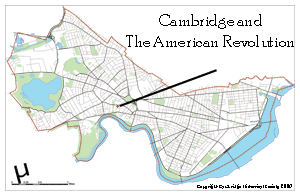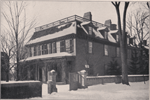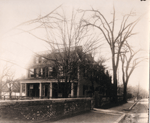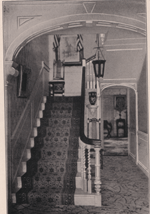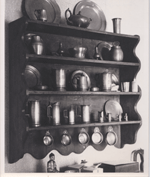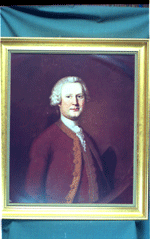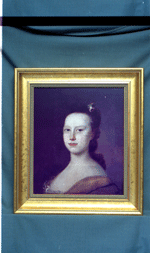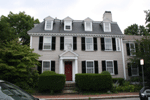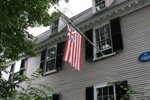Henry Vassall House
This mansion was built in 1746 for Henry Vassall. Its residents Henry Vassall and his wife, Penelope Royall Vassall, were known as the biggest spenders of the Tory Row families. Henry Vassall was the son of a prominent Jamaican planter. He had come to Boston to enjoy its social and educational opportunities. Henry managed to squander much of his inheritance on this opulent property and accompanying lavish lifestyle. The Vassalls established a luxurious estate lauded for its access the town center while offering its owners an air of “rural peace.” They had two slaves, and five servants, as well as formal orchards and gardens. The estate included courtyards, horse stables, and a coach-house containing a slew of top-of-the-line carriages. As you can see, they lived a life chock full of material wealth and aristocratic splendor. Despite their fortune, Henry was described by a family slave as, “...a very wicked man. He was a gamester and spent a great deal of money in cards and lived at the rate of seven years in three, and managed to run out nearly all his property. He was a severe and tart master to his people, and when he was dying asked his servants to pray for him. They answered he might pray for himself.”
Henry died in 1769 of a “lingering illness,” though his wife remained here until 1775 when she fled with other Tories, fearing a colonial rebellion. As increasingly radical rhetoric inspired a rash of colonial resistance to British authority, the Tories’ prescribed role in local society came into question. By 1774, although the future of the resistance to British authority remained uncertain, the seven families knew very well that they had fallen out of the locals’ favor. All of their imported European luxuries and grand estates would have to be abandoned for the sake of their lives.
After Penelope Royall Vassall vacated the estate, the local Committee of Correspondence seized it. The Committee converted it into the central hospital for the Continental Army during the Siege of Boston.
That same year, the Continental Congress at Philadelphia named Benjamin Church, a Harvard graduate and admired Boston physician, the first Surgeon-General of the Continental Army, which was then stationed in Cambridge. Church inhabited the residence only for a few months before he was accused of treason.
For some time, those around him began suspecting Church of consorting with the British. On March 4, 1774, on the eve of the anniversary of the Boston Massacre, British Royal Governor, Thomas Gage, begged John Hancock and Dr. Church not to rouse the Boston masses through public celebration. The patriots refused to back down. Despite the unapologetic patriotism of his speech calling the British soldiers murderers and the American colonists to arms, Church agreed to a private meeting with Governor Gage the following week. In that meeting, Gage supposedly offered Church 3,000 pounds in exchange for his loyalty. Shortly after, Church’s bookkeeper noted that, “all at once he [Church] had several hundred new British guineas.” Although these allegations of bribery are based on hearsay, it was the first of many events that led fellow patriots to question Dr. Church’s devotion to the Glorious Cause.
Years after the fiasco, the legendary Paul Revere commented on Dr. Church, asserting, “…I must say, that I never thought him a man of principle; and I doubted much in my own mind, whether he was a real whig.” Despite Revere’s skepticism, one must understand that Dr. Church’s resume spoke for itself. He was a seasoned Son of Liberty, member of the Provincial Congress, and head of the Committee for Public Safety. Dr. Church treated colonists wounded in the Boston Massacre. He was a published patriot who explicitly mocked the King of England and opposed the Stamp Act. Even so, it was suspected that he also responded to his own articles as an anonymous Tory in support of the motherland. In spite of many patriots’ hunches about Dr. Church’s treachery, the Continental Congress entrusted him with the distinguished position of Surgeon-General of the Continental Army. Dr. Church emphasized that many were jealous of his coveted position, which may well have been the source of the accusations. He desired to resign before he was indicted for any crimes, but his request was denied.
It was later discovered that throughout his time in Cambridge, he was in correspondence with the then head of the British forces, and former Royal Governor of the Massachusetts Bay Colony, General Thomas Gage. Patriots never intercepted any of his letters to General Gage. However, one of his encoded letters to another British military official, Major Cane was intercepted, warranting his arrest. The discovered letter was not a smoking gun, failing to provide irrefutable evidence of his treason. He was still convicted but sentenced only to a Connecticut jail where he was forbidden from writing. Church was later brought back to the Massachusetts Bay Colony where he remained incarcerated until 1778, when Congress decided he was no longer a serious risk and exiled him to an island in the West Indies and, “…threatened [him] with death in case he shod ever return.” It is unlikely that the vessel carrying Church ever made it to the Caribbean. He was never heard from nor seen again.
The saga of Benjamin Church highlights a key complexity in the American Revolution. In 1775, many American colonists still felt very strong ties to Britain that they were not willing to sever. Following the discovery of his correspondence with the British, Benjamin Church was thoroughly vilified as a British spy. But to simply cast him off as a devilish traitor would be selling him short. Although Dr. Church’s loyalty may have been bought by the British, his struggle to choose a side in the Revolution and entirely condemn the other, was a struggle shared by many colonists. The decision to be a loyalist or a patriot was not always clear-cut and tore many provincial families apart. Even the Founding Father, Benjamin Franklin, faced this heart-wrenching dilemma when his son, William, the Royal Governor of New Jersey, refused to reconsider his unwavering loyalty to British Crown. It can be said that the American Revolution prompted a colonial identity crisis. Despite some provincials’ reservations, with the battles of Lexington and Concord and Bunker Hill, it became increasingly clear that a compromise would not be reached through diplomacy.
In a letter to General Gage, Dr. Church illustrates the provincials’ frustration with the British leadership and his own uncertainty about the future of the American colonies, “There is a general revolt of all the Colonies, and sorry I am to say that a temper of submission and accommodation undr the present claims of Britain is nowhere to be found in the Country, some expect redress from the confusion taking place in Britain & seem assured of the Ministers fall, others as sanguinely expect the resentment of Britain and already enjoy success and independence, tho’ there are but few that wish the latter but should hostilities be long continued, & present demands insisted upon I am fearfull of the event, may I never see the day when I shall not dare to call myself a British American.”
Vassall House Today
 |
Back to Interactive Map |
